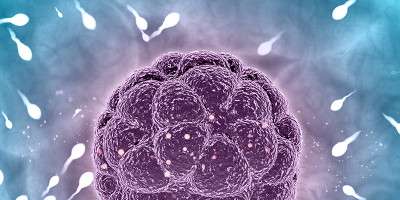Embryo genetic analysis; It is the examination of the chromosomal structure of embryos formed in IVF.
What is Genetically Diagnosed IVF?
Let's talk about genes and chromosomes briefly; genes and chromosomes are the cornerstones of human biological structures. Genes are segments of DNA molecules that encode certain characteristics of the organism. They are present in every cell of humans and are responsible for the transmission of hereditary traits. The human body carries 46 pairs of chromosomes located in its cells. These chromosomes are located in chromatin, the coiled form of DNA molecules. Apart from the two sex chromosomes (X and Y), each human cell has 22 pairs of autosomal chromosomes. Embryo genetic testing is the examination of the chromosome structure, number and genes of embryos.
Hereditary diseases can be passed on to children because of the genetic predisposition of the parents. However, thanks to modern medical methods, the birth of healthy children has become possible with technologies such as genetic screening in in vitro fertilisation and genetic tests during pregnancy. Especially parents with a family history of genetic diseases should be careful because they can pass these diseases to their children. For this reason, it is important for individuals who are considering having a child and are at risk to receive genetic counselling and, if necessary, to have genetic tests. This approach ensures the prevention of genetic diseases and can contribute to healthy family planning and increase the health and happiness of families.
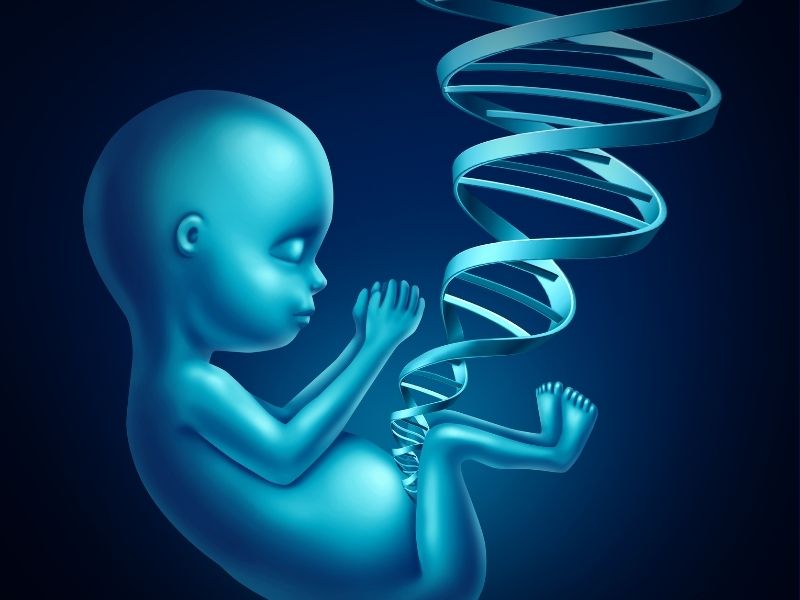
Genetically Diagnosed IVF
What is Embryo Genetic Testing?
Embryo genetic testing, known as Preimplantation Genetic Diagnosis (PGD, Preimplantation Genetic Diagnosis, PGD) and Preimplantation Genetic Screening (PGS), is a method used to evaluate the genetic health of embryos in the IVF process. This method is used to detect genetic disorders of the embryo created by combining sperm and egg before transfer. Embryo genetic diagnosis test allows the selection of healthy embryos.
In IVF embryo genetic examination, 5-10 cell biopsies are taken from embryos that go to the 5th or 6th day during the IVF treatment process and are of sufficient maturity and genetic examination is performed. These biopsies do not harm the embryo. This process is called embryo genetic analysis.
Genetic analysis of embryos prevents the transfer of genetic disorders in the mother and father candidate to the baby.
Embryo genetic testing can be used to detect various genetic disorders. These include chromosomal abnormalities, carriage of genetic diseases, single-gene disorders and specific gene mutations.
PGS (Preimplantation Genetic Screening) is performed to detect chromosome abnormalities (aneuploidy) in the absence of genetic problems in the expectant mother and father.
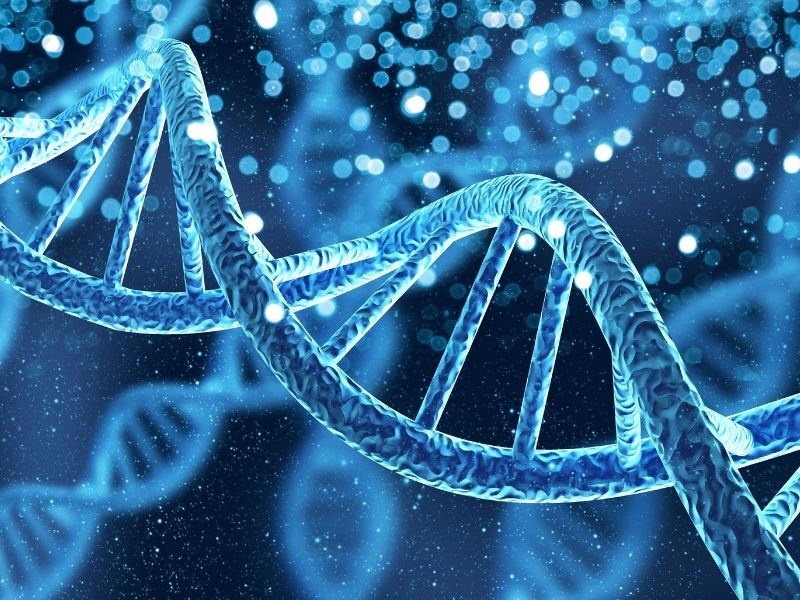
Embryo Genetic Testing
What does positive genetic test result mean?
When a genetic test result is positive, it usually indicates that there is an abnormality in one or more of the genetic traits examined in the test or a risk of a specific genetic disease. Positive results may indicate that an individual has an increased risk of having a particular disease or genetic condition or may be a carrier. However, a positive result is usually not a diagnosis, but indicates the presence of a particular risk or carrier.
A positive genetic test result may require the individual and health professionals to take certain precautions. For example, if a couple has a positive embryo genetic test, the chances of success in IVF treatment can be increased by eliminating embryos at risk of a particular genetic disease or by selecting healthy embryos. Similarly, if an expectant mother receives a positive genetic test result during pregnancy, more careful planning can be made regarding the health status and postnatal care of the baby to be born.
However, a positive genetic test result is not always a cause for concern and may have different consequences for each individual. Therefore, it is important for people who receive a positive genetic test result to have a detailed discussion with a genetic counsellor or specialist. Experts can provide the guidance needed to explain the meaning of positive results, assess possible risks and recommend appropriate treatment or preventive measures.
What is Genetic Testing in Pregnancy?
Genetic tests during pregnancy are tests performed to evaluate the genetic health of the expectant mother's baby during pregnancy. These tests aim to determine the presence of hereditary diseases or genetic abnormalities by examining the genetic structure of the foetus. Some examples of genetic tests during pregnancy: Double test, triple test, quadruple test, fetal DNA test. These tests are screening tests. CVS (chorionic villus sampling) or amniocentesis, which are diagnostic tests, can be diagnosed by direct genetic examination of cells. In case of a risk of genetic disease during pregnancy, the best approach is genetic examination of embryos before pregnancy. With the transfer of genetically healthy embryos, the possibility of giving birth to a child with genetic problems is considerably reduced.
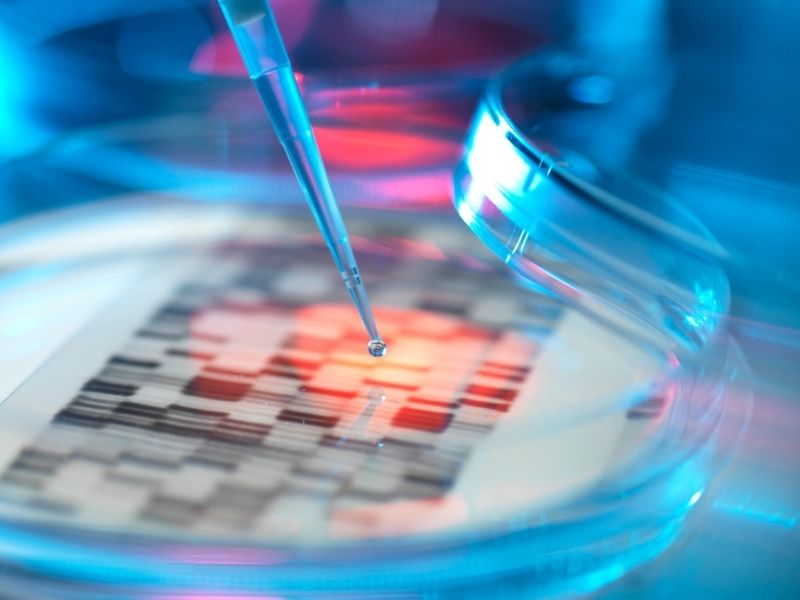
Genetic Test Result Positive
How is IVF Genetic Screening Test Performed?
Embryo genetic testing; preimplantation genetic diagnosis (PGD, PGT) or preimplantation genetic screening (PGS) tests. This process usually includes the following steps:
In vitro fertilisation: First of all, egg from the expectant mother and sperm from the expectant father are taken and fertilisation is performed in a laboratory environment.
Embryo Development: Fertilised eggs are followed in the laboratory for 5-6 days to form embryos.
Embryo Biopsy: At a certain stage of embryo development, one or more cells are taken and biopsied for genetic analysis. Previously, embryo biopsy was performed on day 3. However, embryos have 6-8 cells on day 3 and taking one or two biopsies can damage the embryo. Therefore, day 5 embryo biopsy is preferred today. The day 5 embryo (blastocyst) consists of 2 layers. The inner layer (inner cell mass) is the layer in which the baby will develop, and the outer layer (outer cell mass) is the layer in which the tropho-ectoderm, the placenta, will develop. The embryo biopsy is taken from the outer layer and the inner layer is not damaged by the biopsy. A biopsy of 5-10 cells is taken from the blastocyst under a microscope and sent to the genetic laboratory for genetic examination. IVF embryo biopsy does not harm the embryo.
Genetic analysis Genetic analysis is performed on the cells taken from the embryo biopsy. This analysis can be performed to examine the chromosomal structure of the embryo or to determine the presence or carriage of certain genetic diseases. The methods used may include polymerase chain reaction (PCR), array karyotyping or the more advanced technology of next-generation sequencing (NGS).
Embryo Freezing: Embryos are frozen pending the results of the genetic test. It is not possible for the embryos to remain fresh and viable for the approximately 2 weeks that the genetic test result is expected, so the embryos are frozen and awaited.
Selection of healthy embryos: Based on the results of the genetic analysis, healthy embryos are identified and selected for transfer.
Embryo Transfer: Genetically healthy embryos are transferred into the uterus of the expectant mother.
PGD is used to increase the chances of a healthy IVF success for couples who are genetically at risk. However, it is important to remember that PGD is not always 100% accurate and is not guaranteed to detect all genetic disorders.
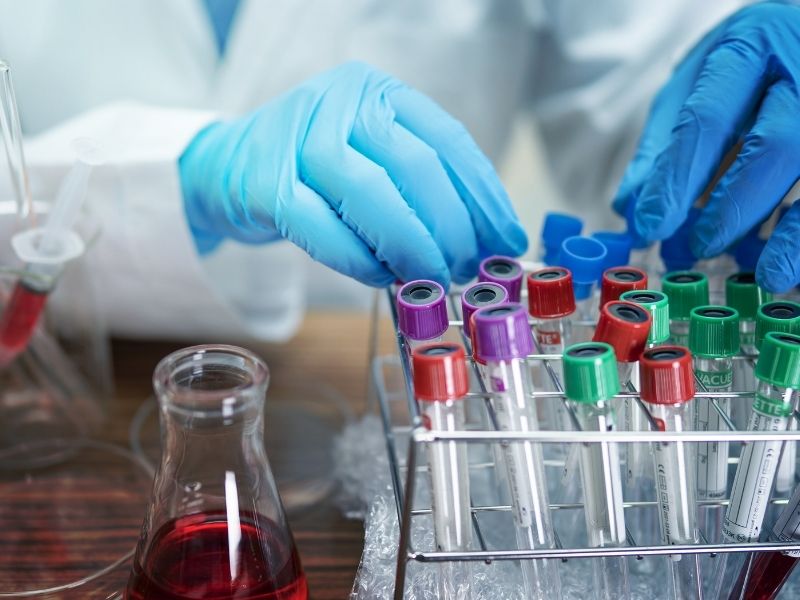
IVF Genetic Screening Test
What are IVF Embryo Genetic Analysis Methods?
PCR (Polymerase Chain Reaction) technique is used for the diagnosis of single gene diseases. A few of the embryo cells are taken by biopsy and genetic material is prepared in special solutions to be analysed. The identified gene region is amplified and the gene sequence is determined to determine whether the embryo carries the disease.
Fluorescence in situ hybridisation (FISH) is used to detect numerical and structural abnormalities in the chromosomes. The embryo cell is biopsied and specific chromosome regions are identified in the laboratory using special probes. In this way, healthy embryos can be separated from unhealthy ones.
NGS stands for ‘Next Generation Sequencing’. NGS refers to the DNA or RNA sequencing process. This technology allows many DNA or RNA molecules to be sequenced simultaneously and rapidly. NGS is widely used in many fields, especially in genetic research and medical diagnosis and treatment.
How is NGS different from conventional PGD? NGS is a technology used to perform the genetic analysis of conventional PGD. While a limited number of gene regions or chromosomes are usually examined in conventional PGD, NGS allows many genes to be analysed simultaneously and in detail. This allows for a more comprehensive genetic screening and a better assessment of the genetic risks that an embryo carries. Therefore, NGS-based PGD provides a more comprehensive genetic analysis than conventional PGD and allows for more precise results.
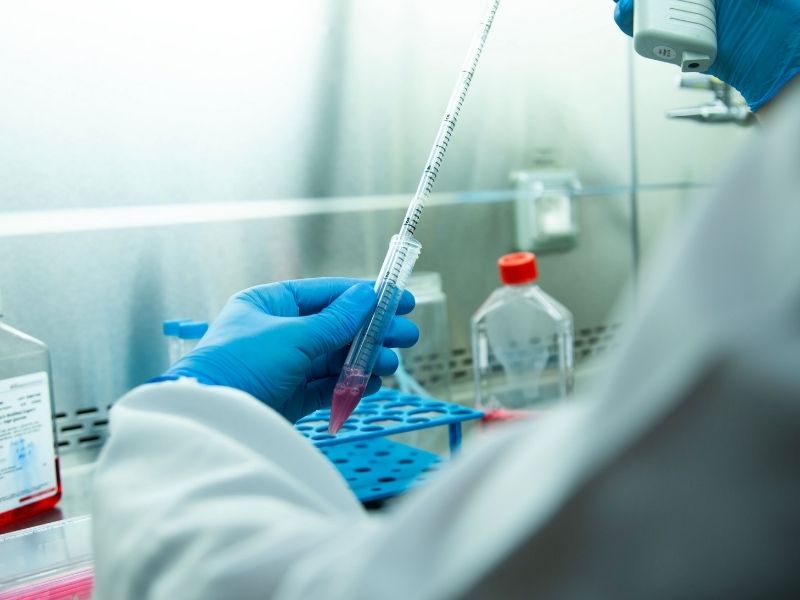
Embryo Genetic Analysis Methods
To whom is IVF Genetic Screening Performed?
To whom is embryo genetic testing performed? Embryo genetic testing is performed during in vitro fertilisation (IVF), but it is not a routine recommended procedure. This screening is performed to determine whether embryos carry genetic disorders. Embryo genetic screening should be performed in the following cases:
- Recurrent Miscarriage History (Recurrent Pregnancy Losses): In couples who have experienced recurrent miscarriages, embryo genetic screening can be performed to identify genetic factors underlying recurrent miscarriages.
- Advanced Female Age (Advanced Maternal Age): Especially women over the age of 37 may experience a decrease in egg quality and an increase in embryo chromosome abnormalities due to advanced age. Since the risk of embryo genetic abnormalities increases in older women, embryo genetic screening is recommended. Embryos with abnormal genetics are one of the most important reasons for IVF failure.
- Repeated Unsuccessful IVF Trials: After repeated failed IVF attempts, screening can be performed to evaluate the genetic health of embryos.
- Carrier Screening: It can be performed to determine whether the couple carries certain genetic diseases and to evaluate the effects of these diseases on the embryo. In the presence of certain genetic disorders in the expectant mother and father (such as translocation carriage), the embryos should be genetically analysed.
- Infertility due to male factor
- had a child with a genetic disease in a previous pregnancy
- Tissue-matched (hla) sibling in cases such as marrow transplantation
- Couples at risk of single gene disease
- Genetic screening is recommended for consanguineous couples.
-
Embryo genetic screening is done as part of the genetic counselling process and can help couples make informed decisions about their embryos. This screening is used to increase the chances of a healthy pregnancy and a healthy birth, and you should be referred by an experienced physician.

Embryo Genetics Advantage
What is the Advantage of Embryo Genetics?
Today, many couples resort to in vitro fertilisation to make their dreams of having a child come true. However, in the IVF process, it is important not only to initiate pregnancy, but also to achieve a healthy pregnancy. At this point, genetic analysis can help couples make a healthy start.
Genetic analysis is a method used to evaluate the genetic health of embryos and to determine the presence of genetic diseases. This analysis enables the selection of healthy embryos by examining the genetic structure of embryos before embryo transfer.
The benefits of embryo genetics can be listed as follows:
- Early detection of genetic disorders: Embryo genetics analyses the genetic structure of embryos and detects potential genetic disorders early. This prevents the transfer of potentially diseased embryos and increases the chances of a healthy pregnancy.
- Reduces the Risk of Miscarriage: Most recurrent miscarriages and recurrent IVF failures are caused by genetic problems in the embryo. Embryo genetics can be used to identify genetic factors underlying recurrent miscarriages. This increases the chances of expectant mothers to have a healthy pregnancy.
- Increases the Chance of Live Birth: After genetically healthy embryo transfer, the rate of embryo attachment to the mother's uterus and IVF live birth rate increases.
- Prevention of Genetic Diseases: Embryo genetics can increase the chances of couples to have healthy babies by determining the presence or carriage of certain genetic diseases. Thus, the risk of genetic diseases in the family can be reduced. In addition, if there is a certain genetic problem diagnosed in the previous children of the family, a healthy baby can be born after the embryos formed by in vitro fertilisation are examined and genetically healthy embryos are transferred.
- Improving Pregnancy Outcomes: Embryo genetic procedures can improve pregnancy outcomes by ensuring that healthy embryos are selected. This increases the likelihood of a healthy pregnancy and a healthy birth. Single embryo transfer reduces the risk of twin or triplet pregnancy.
- Protection of mother and baby health: The transfer of healthy embryos protects the health of the mother and baby. Selection of genetically healthy embryos can reduce the risk of complications at birth and provide psychological relief to the family.
- Reducing the Psychological Burden of IVF: In repeated unsuccessful IVF attempts, the mother and father-to-be are also affected psychologically. The genetically good embryo transferred with embryo genetic examination has a high chance of IVF retention and IVF live birth rate. In this way, the rate of pregnancy news in the first attempt and the rate of healthy live birth in IVF is high.
These advantages enable embryo genetic procedures to improve the happiness and health of families by increasing the chances of couples achieving a healthy pregnancy.
What are the Problems in Embryo Genetic Procedures?
- Embryo biopsy on day 3 is no longer recommended as it was done in the past. Therefore, embryos are expected to go to day 5. Sometimes embryos may not go to day 5 and in this case IVF embryo biopsy is not performed.
- The chance of pregnancy after day 5 embryo transfer with normal genetics is not 100%. If pregnancy does not occur after genetically normal embryo transfer, it is recommended to transfer another embryo with normal genetics.
- Sometimes all genetically analysed embryos may be problematic and the couple may need to undergo IVF treatment again, collect eggs and create embryos.
- Genetically normal embryo transfer does not eliminate the risk of pregnancy complications. Therefore, expectant mothers with the possibility of risky pregnancy should be identified before embryo transfer and embryo transfer should be planned after treatment.

Mosaic Embryo
What is a mosaic embryo?
Mosaism is the presence of different genetic cell lines in an individual. In studies, many healthy live births have been reported after the transfer of mosaic embryos and these data are increasing day by day.
Does genetically defective embryo transfer work? Mosaicism can occur as a result of embryo genetic analysis. Healthy births from embryos are possible through different mechanisms.
- Firstly, mosaic embryos can correct themselves and destroy abnormal cells. Failure to do so may result in a true mosaic foetus or genetic disorders.
- Second, the mosaicism result is an intermediate result observed in the biopsy sample and may not fully reflect the true genetic situation.
- Third, a single biopsy result may not fully represent the true genetic composition of the embryo.
Mosaic embryos are transferred classified according to the percentage of abnormal cells, but this classification is not evidence-based. In general, mosaic embryo transfer is associated with a reduced live birth rate and increased miscarriage rate compared to euploid transfers. However, recent evidence suggests that embryos with mosaic results are not a barrier to live births. Therefore, it is advocated that these embryos should be transferred rather than discarded. Mosaism is a significant challenge of PGD-A and may present further challenges in the field of reproductive genetics in the future.
What is a genetic screening test?
Embryo genetic testing is performed for screening (PGS, PGD-A) or diagnostic purposes (PGD, PGD-M). Embryo genetic screening test (PGS, pregenetic screening test, PGD-M) is recommended for the examination of embryos in cases of recurrent miscarriages, recurrent IVF failures or advanced age of the mother-to-be, as the possibility of chromosomal abnormalities is higher.
In the past, genetic testing was only carried out for specific chromosomes using FISH, whereas nowadays a comprehensive chromosomal screening (aCGH) technique can be used to identify all chromosomes of the embryo and any defects in these chromosomes.
Embryo genetic diagnosis testing (PGD, preimplantation genetic diagnosis testing, PGD, PGT, PGT-A) is the investigation of a known genetic abnormality in the expectant mother or father or, if they are carriers, whether this genetic problem is present in the embryo. Candidates for PGD are couples with chromosomal abnormalities (translocations, inversions) or known carriers of mutations such as cystic fibrosis, mediterranean anaemia, known familial history of genetic disease or known genetic disease in previous children. PGD is also commonly used to identify embryos with the appropriate tissue type (HLA typing) for the treatment of a sibling with a blood disorder.
Genetic Disease Carrier Test; It is performed for couples who have a child with a genetic disease, family members who are carriers of genetic diseases, couples who make consanguineous marriages, which are common in our country, and couples belonging to certain ethnic groups. This test provides an assessment of more than 200 genetic diseases and approximately 1600 mutations that have the potential to be carriers.
If the woman and the man have balanced chromosomal abnormalities, even if they appear completely normal, it can be the cause of autism, mental retardation, developmental delay, defective appearance and many anomalies in their children. In this case, up to 80 per cent of the embryos formed in in vitro fertilisation may be abnormal or carrier.
Chromosome karyotyping is performed in the blood of men and women.
The newly developed chromosomal microarray test detects small genomic imbalances that conventional karyotyping tests cannot detect and provides more diagnostic information.

Genetic Examination
How is Genetic Examination Performed?
Genetic examination is performed to examine the genetic structure of a person and to identify potential genetic diseases. Genetic examination in the IVF process usually includes the following steps:
- Priority Evaluation and Family History: In the primary evaluation of couples applying to the IVF clinic, the family history and genetic history of the couples are examined. At this stage, the presence of genetic diseases in previous pregnancies or in the family is tried to be determined.
- Genetic Counselling: Genetic counselling is offered to couples before starting the IVF process. This counselling provides information to couples about genetic risks, explains the advantages and disadvantages of genetic tests and informs them about possible genetic risks they may encounter during the treatment process.
- Genetic Tests: In some cases, genetic tests may be recommended to couples. These tests are done to identify certain genetic diseases that couples are carriers of or at risk for. Blood samples or other tissue samples are usually used for testing.
- Embryo Genetic Testing (PGD): Some couples may undergo embryo genetic testing during the IVF process. These tests, also known as preimplantation genetic diagnosis (PGD), are used to assess the genetic health of embryos. These tests include embryo biopsy and genetic analyses.
- Evaluation of Genetic Results and Treatment Plan: Genetic test results are analysed and interpreted by specialists. A treatment plan is then determined and individualised based on the couples' genetic risks and genetic test results.
Genetic examination during the IVF process is important to increase the chances of a healthy pregnancy and reduce the risk of genetic diseases. Expert genetic counselling and accurate genetic tests are critical for couples to make the right decisions in this process.
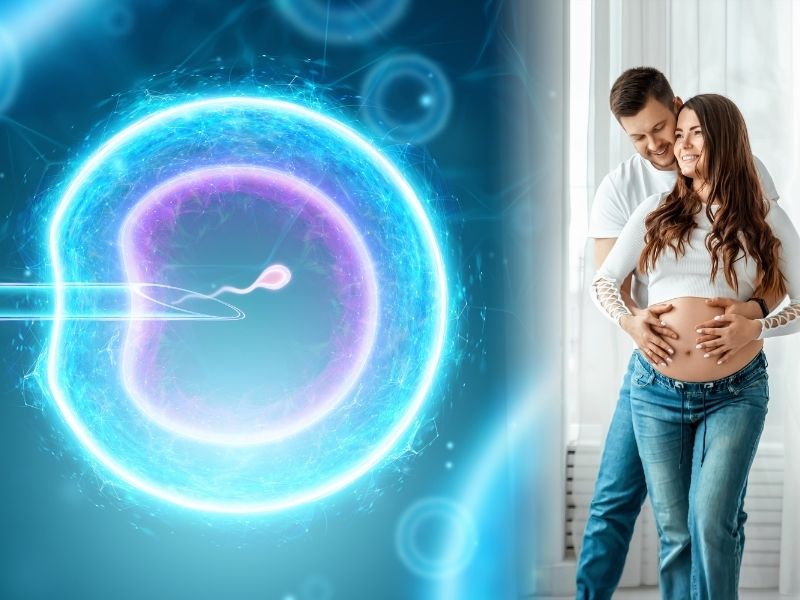
IVF Genetic Examination
Does IVF Genetic Testing Harm the Embryo?
Preimplantation genetic diagnosis (PGD) and screening tests are generally considered safe. Day 5 and 6 embryos contain more than 100 cells. In experienced hands, the biopsy does not harm the embryo. However, as with any medical procedure, it is important to recognise that there are potential risks. Here are some important points:
Embryo Biopsy: During PGD, it may be necessary to remove one or more cells from the embryo. This biopsy procedure can affect the health of the embryo and potentially cause harm. However, when performed by an experienced specialist and using appropriate techniques, this risk is minimal.
Laboratory Procedures: After the embryo biopsy, the cells are processed in the laboratory for genetic analysis. These procedures can potentially have an effect on the embryo. However, when performed by modern laboratory technology and experienced laboratory personnel, the risk of harm is minimal.
Implantation Failure: There is concern that embryo biopsy and genetic analyses may adversely affect the development of the embryo and lead to implantation failure. However, studies show that these concerns should be largely underestimated. When performed appropriately, embryo genetic analysis has not been found to reduce pregnancy rates and does not affect healthy birth rates.
Rare Complications: In rare cases, complications can occur during embryo biopsy or laboratory procedures. Conditions such as infection, bleeding or embryo damage may occur. However, when performed by an experienced healthcare team, the risk of such complications is minimal.
In general, PGD and screening tests, when performed correctly and managed by an experienced team, carry minimal risk of damage to the embryo. Patients should be thoroughly informed about the potential risks before starting treatment and should discuss them with their doctor if necessary.
What are the prices for genetic screening tests?
Embryo genetic testing fees can vary depending on many factors and can vary from clinic to clinic. However, generally, the cost of embryo genetic testing can be high. This cost varies depending on the technology used, the scope of the test, the experience of the laboratory, the country's health system.
Usually, the fee for embryo genetic testing includes embryo biopsy, genetic analyses, laboratory work, counselling services and other related costs. In addition, some clinics may offer additional services or optional tests, which may also affect the cost.
In particular, advanced embryo genetic testing, such as preimplantation genetic diagnosis (PGD), can have higher costs. These tests are used to assess the genetic health of embryos in more detail and often require more advanced technology and expertise.
As a clinic, patient satisfaction and health are our priorities. We are here as Dr Çiğdem Yayla Abide and her team to protect the health of you and your baby by offering the most appropriate and effective solutions with a patient-oriented approach. You can contact us to get more information about the prices of our tests and to learn about our payment options.
What is the purpose of embryo genetic testing?
Abnormalities in embryo genetics are the most common cause of IVF treatment failure. Genetic diagnosis in in vitro fertilisation is a technique performed as part of the in vitro fertilisation (IVF) process. In this process, the genetic health of embryos is evaluated and the aim is to detect genetic diseases or to determine genetic carriage.
What is looked for in embryo genetic screening?
In embryo genetic screening, the presence of aneuploidy by looking at the embryo chromosome structure, number and shape (Down syndrome, Edwards syndrome etc...), the presence of single gene diseases by examining the genes on the chromosome (SMA, Cystic Fibrosis, thalassemia etc...), hereditary diseases such as Mediterranean fever, some cancers carrying specific genes such as breast cancer are investigated.
How Many Days Does Embryo Genetic Testing Take?
One of the most frequently asked questions; ‘when is the embryo genetic test result? Embryo genetic testing (PGS, PGD) results are available within a week to 10 days. It varies according to the genetic abnormality examined by the embryo genetic diagnosis test, this period is prolonged in some hereditary diseases.
What is Embryo Freezing After Genetic Screening Test?
In IVF treatment with genetic diagnosis, biopsies are taken for genetic analysis from embryos that go to day 5. The biopsies are sent to the genetics department for genetic analysis. While waiting for the IVF genetic diagnosis result, the embryos from which biopsies are taken are frozen and kept for future transfer. When the embryo genetic analysis result is obtained, genetically healthy embryos are thawed and transferred. With the fast freezing method called vitrification, embryos can be stored in our contracted laboratory for years without deterioration.
Why does a genetically intact embryo fail?
The pregnancy rate increases to 80% after genetically intact embryo transfer. Things to be considered if pregnancy does not occur after genetically normal embryo transfer;
- Systemic diseases such as hormonal problems (thyroid diseases, prolactin elevations), diabetes ,
- Problems such as obstruction in the tubes, adhesions in the uterus,
- Poor embryo quality can be listed as follows.
Biopsy is not recommended for every embryo. An experienced physician and embryologist should advise you on which embryos should be biopsied.






